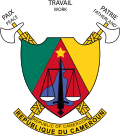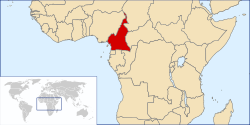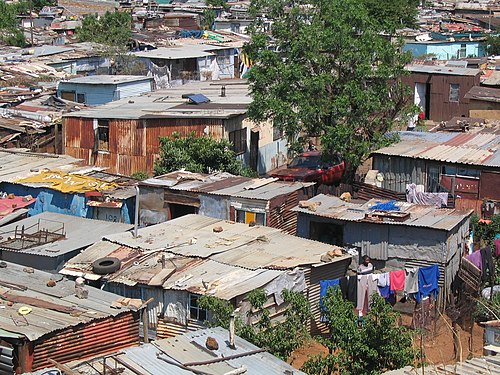Portal:Africa



Africa is the world's second-largest and second-most populous continent after Asia. At about 30.3 million km2 (11.7 million square miles) including adjacent islands, it covers 20% of Earth's land area and 6% of its total surface area. With nearly 1.4 billion people as of 2021, it accounts for about 18% of the world's human population. Africa's population is the youngest among all the continents; the median age in 2012 was 19.7, when the worldwide median age was 30.4. Based on 2024 projections, Africa's population will exceed 3.8 billion people by 2100. Africa is the least wealthy inhabited continent per capita and second-least wealthy by total wealth, ahead of Oceania. Scholars have attributed this to different factors including geography, climate, corruption, colonialism, the Cold War, and neocolonialism. Despite this low concentration of wealth, recent economic expansion and a large and young population make Africa an important economic market in the broader global context, and Africa has a large quantity of natural resources.
Africa is highly biodiverse; it is the continent with the largest number of megafauna species, as it was least affected by the extinction of the Pleistocene megafauna. However, Africa is also heavily affected by a wide range of environmental issues, including desertification, deforestation, water scarcity, and pollution. These entrenched environmental concerns are expected to worsen as climate change impacts Africa. The UN Intergovernmental Panel on Climate Change has identified Africa as the continent most vulnerable to climate change.
The history of Africa is long, complex, and varied, and has often been under-appreciated by the global historical community. In African societies the oral word is revered, and they have generally recorded their history via oral tradition, which has led anthropologists to term them "oral civilisations", contrasted with "literate civilisations" which pride the written word. African culture is rich and diverse both within and between the continent's regions, encompassing art, cuisine, music and dance, religion, and dress.
Africa, particularly Eastern Africa, is widely accepted to be the place of origin of humans and the Hominidae clade, also known as the great apes. The earliest hominids and their ancestors have been dated to around 7 million years ago, and Homo sapiens (modern human) are believed to have originated in Africa 350,000 to 260,000 years ago. In the 4th and 3rd millennia BCE Ancient Egypt, Kerma, Punt, and the Tichitt Tradition emerged in North, East and West Africa, while from 3000 BCE to 500 CE the Bantu expansion swept from modern-day Cameroon through Central, East, and Southern Africa, displacing or absorbing groups such as the Khoisan and Pygmies. Some African empires include Wagadu, Mali, Songhai, Sokoto, Ife, Benin, Asante, the Fatimids, Almoravids, Almohads, Ayyubids, Mamluks, Kongo, Mwene Muji, Luba, Lunda, Kitara, Aksum, Ethiopia, Adal, Ajuran, Kilwa, Sakalava, Imerina, Maravi, Mutapa, Rozvi, Mthwakazi, and Zulu. Despite the predominance of states, many societies were heterarchical and stateless. Slave trades created various diasporas, especially in the Americas. From the late 19th century to early 20th century, driven by the Second Industrial Revolution, most of Africa was rapidly conquered and colonised by European nations, save for Ethiopia and Liberia. European rule had significant impacts on Africa's societies, and colonies were maintained for the purpose of economic exploitation and extraction of natural resources. Most present states emerged from a process of decolonisation following World War II, and established the Organisation of African Unity in 1963, the predecessor to the African Union. The nascent countries decided to keep their colonial borders, with traditional power structures used in governance to varying degrees. (Full article...)
Selected article –

The Niger women's national football team represents Niger in international women's football. It is governed by the Nigerien Football Federation. It has played in four FIFA-recognised matches, two of which were losses to Burkina Faso women's national football team in 2007. There is an under-20 women's national team who were supposed to participate in the 2002 African Women U-19 Championship but withdrew before playing a game. Some problems impact the development of the women's game in Africa that effect Niger of which sexism, abuse, homophobia, religion and financial setbacks have been huge factors. (Full article...)
Featured pictures –
Did you know (auto-generated) -

- ... that the Octavius V. Catto Memorial, unveiled in 2017, contains the first statue on Philadelphia public property of a specific African American?
- ... that 555 Edgecombe Avenue, once named for a British soldier and occupied entirely by white Americans, later attracted notable African Americans like Paul Robeson and Count Basie?
- ... that after Benjamin Moloise's execution, the extremist group Direct Action bombed two Paris companies linked to South Africa in protest?
- ... that the Phoenixonian Institute was the first African-American high school in California?
- ... that South African politician Speedy Mashilo was kidnapped for seven hours?
- ... that Erick Russell is the first openly gay African American elected to a statewide office in the United States?
Categories
Selected biography –
Jean-Joseph Rabearivelo (4 March 1901 or 1903 – 22 June 1937), born Joseph-Casimir Rabearivelo, was a Malagasy poet who is widely considered to be Africa's first modern poet and the greatest literary artist of Madagascar. Part of the first Malagasy generation raised under French colonization, Rabearivelo grew up impoverished and failed to complete secondary education. His passion for French literature and traditional Malagasy oral poetry (hainteny) prompted him to read extensively and educate himself on a variety of subjects, including the French language and its poetic and prose traditions. He published his first poems as an adolescent in local literary reviews, soon obtaining employment at a publishing house where he worked as a proofreader and editor of its literary journals. He published numerous poetry anthologies in French and Malagasy as well as literary critiques, an opera, and two novels.
Rabearivelo's early period of modernist-inspired poetry showed skill and attracted critical attention, but adhered strictly to traditional genre conventions. The surrealist poetry he composed beginning in 1931 displayed greater originality, garnering him strong praise and acclaim. Despite increasing critical attention in international poetry reviews, Rabearivelo was never afforded access to the elite social circles of colonial Madagascar. He suffered a series of personal and professional disappointments, including the death of his daughter, the French authorities' decision to exclude him from the list of exhibitors at the Universal Exposition in Paris, and growing personal debt worsened by his opium addiction and philandering. Following Rabearivelo's suicide by cyanide poisoning in 1937, he became viewed as a colonial martyr. (Full article...)
Selected country –
 |
 |
|

| ||
Cameroon, officially the Republic of Cameroon, is a unitary republic of central and western Africa. It borders Nigeria to the west, Chad to the northeast, the Central African Republic to the east, and Equatorial Guinea, Gabon, and the Republic of the Congo to the south. Cameroon's coastline lies on the Bight of Bonny, part of the Gulf of Guinea. The highest point is Mount Cameroon in the southwest, and the largest cities are Douala, Yaoundé, and Garoua. Cameroon is home to over 200 different ethnic and linguistic groups.
Compared with other African countries, Cameroon enjoys relative political and social stability. This has permitted the development of agriculture, roads, railways, and large petroleum and timber industries. Nevertheless, large numbers of Cameroonians live in poverty as subsistence farmers. Power lies firmly in the hands of the president, Paul Biya, and his Cameroon People's Democratic Movement party, and corruption is widespread. The Anglophone community has grown increasingly alienated from the government, and Anglophone politicians have called for greater decentralisation and even the secession of the former British-governed territories. (Read more...)
Selected city –
Beira (Portuguese pronunciation: [ˈbejɾɐ]) is the capital and largest city of Sofala Province, in the central region of Mozambique.
Beira is where the Pungwe River meets the Indian Ocean. It is the fourth-largest city by population in Mozambique, after Maputo, Matola and Nampula. Beira had a population of 397,368 in 1997, which grew to 530,604 in 2019. A coastal city, it holds the regionally significant Port of Beira, which acts as a gateway for both the central interior portion of the country as well as the land-locked nations of Zimbabwe, Zambia and Malawi. (Full article...)
In the news
- 15 May 2025 – Islamist insurgency in Burkina Faso
- Al-Qaeda affiliated Islamist militant group Jama'at Nasr al-Islam wal-Muslimin claims 200 soldiers were killed in an attack on a Burkina Faso Armed Forces military base on Sunday in Djibo, Sahel, Burkina Faso. They also claimed responsibility for another attack this week at a military post in Loroum Province that killed 60 soldiers. (Al Jazeera)
- 13 May 2025 – 2025 Malian protests, 2020 Malian coup d'état
- Malian interim president Assimi Goïta signs a decree dissolving all political parties and organizations and bans them from holding meetings following ongoing pro-democracy protests in the capital city Bamako. (AP) (Al Jazeera)
- 12 May 2025 – Libyan crisis
- 2025 Tripoli clashes
- Clashes erupt between rival militia gunmen from the 444th Brigade and the Stability Support Apparatus in Tripoli, Libya, after the assassination of Commander Abdel Ghani al-Kikli. Six people are injured, and a state of emergency is declared by authorities. (The Jerusalem Post) (Al Jazeera English)
- 12 May 2025 –
- Unknown gunmen attack a Chinese artisanal gold mine in Narena, Koulikoro Region, Mali, killing one Malian and two others from Ghana, and abducting two Chinese nationals. (AP)
- 12 May 2025 – Immigration policy of the second Donald Trump administration, South Africa–United States relations
- The first group of Afrikaners arrive in the United States after U.S. president Donald Trump grants refugee status to the white minority group, who Trump says face a "genocide" in the South African farm attacks. The government of South Africa rejects the claims. (AP)
Updated: 8:05, 16 May 2025
General images -
Africa topics
More did you know –

- ... that the British Museum's oldest African-American object is the Akan Drum (pictured) that was used to "dance the slaves"?
- ... that L.C. Lecesne rose to prominence as an activist against slavery after the British Government compensated him for his illegal exile from Jamaica?
- ... that despite receiving a budget allocation in 2003, the public sports stadium in Gibeon, Namibia, hadn't been repaired as of December 2007?
- ... that Thomas Edward Wilkinson was made Bishop of Zululand after his predecessor in South Africa, John Colenso, was excommunicated?
Related portals
Major Religions in Africa
North Africa
West Africa
Central Africa
East Africa
Southern Africa
Associated Wikimedia
The following Wikimedia Foundation sister projects provide more on this subject:
-
Commons
Free media repository -
Wikibooks
Free textbooks and manuals -
Wikidata
Free knowledge base -
Wikinews
Free-content news -
Wikiquote
Collection of quotations -
Wikisource
Free-content library -
Wikispecies
Directory of species -
Wikiversity
Free learning tools -
Wikivoyage
Free travel guide -
Wiktionary
Dictionary and thesaurus



























































































